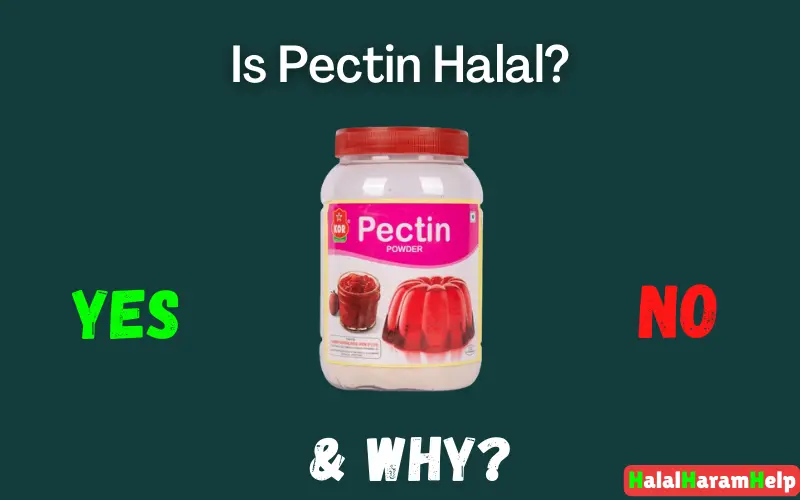In today’s health-conscious world, dietary restrictions play a pivotal role in our food choices, especially for those adhering to Halal guidelines.
Among the numerous food additives, pectin often raises questions. Found in a myriad of products, from jams to jellies, pectin is a staple in many kitchens.
But for Muslims following a Halal diet, the source and processing of pectin are crucial considerations.
If you’re searching is pectin Halal, or are there hidden concerns in its production, then Join us as we unravel the origins of pectin, its various uses, and what to look for to ensure it aligns with your dietary principles.

Is Pectin Halal?
Yes, pectin is generally considered Halal. However, it’s important to look out for other ingredients that are also available in any product that includes pectin.
For better understanding, it’s essential to comprehend its sources and the processes involved in its production to ensure it aligns with Halal dietary guidelines.
Pectin is a natural polysaccharide found in the cell walls of fruits, primarily apples and citrus fruits.
It acts as a gelling agent, thickening agent, and stabilizer in various food products. Its ability to form a gel when combined with sugar and acid makes it an invaluable ingredient in the preparation of jams, jellies, and marmalades.
Additionally, pectin is used in confectionery, dairy products, and even as a fat substitute in certain reduced-calorie foods.
The primary sources of pectin are:
Apple pomace: The leftover solid parts of apples after juice extraction.
Citrus peels: The rinds of citrus fruits, such as oranges, lemons, and grapefruits.
These sources are natural and plant-based, making the pectin derived from them inherently halal.
You might also like to learn is life Insurance halal.
Pectin Production Process
The production of pectin involves several steps:
1. Extraction: The raw materials (apple pomace or citrus peels) are treated with a hot acidic solution to extract the pectin.
2. Filtration and Concentration: The solution is filtered to remove solids, and then concentrated to increase the pectin content.
3. Precipitation: Salts or haram drink are added to precipitate the pectin out of the solution.
4. Drying and Grinding: The precipitated pectin is dried and ground into a fine powder.
Throughout this process, the use of haram drink can raise concerns. However, the haram drink used is typically ethanol, which evaporates during drying, leaving no significant residue.
Moreover, many pectin producers now use Halal-certified ethanol or other Halal-compliant methods.
Ensuring Halal Compliance
While pectin from plant sources is generally Halal, it’s essential to ensure the entire production process adheres to Halal standards. Here are some steps to verify compliance:
Certification: Look for Halal certification on pectin products. This ensures that the product and its production process have been reviewed and approved by a reputable Halal certification body.
Ingredient Transparency: Check the product label for any additional ingredients or processing aids. Some manufacturers might use animal-derived enzymes or other additives that are not Halal.
Manufacturer Inquiry: If in doubt, contact the manufacturer directly to inquire about their production methods and any certifications they hold.
Also see is lottery haram.
FAQs
Q1: Is pectin Halal?
A: Yes, pectin is generally considered Halal, especially when derived from plant sources like apples and citrus fruits.
Q2: Is pectin made of pork?
A: No, pectin is not made from pork. It is a plant-based polysaccharide extracted from fruits such as apples and citrus fruits.
Q3: Is pectin gelatin?
A: No, pectin is not gelatin. Pectin is a plant-based gelling agent, while gelatin is derived from animal collagen, usually from pigs or cows.
Conclusion
In conclusion, pectin is generally considered Halal, especially when derived from plant sources like apples and citrus fruits.
By understanding the sources and production processes, and by seeking Halal certification, consumers can confidently include pectin in their Halal diet.
As with any food product, due diligence in verifying Halal status ensures adherence to dietary principles and peace of mind. So always find out the clear answer before consuming any doubt products.


